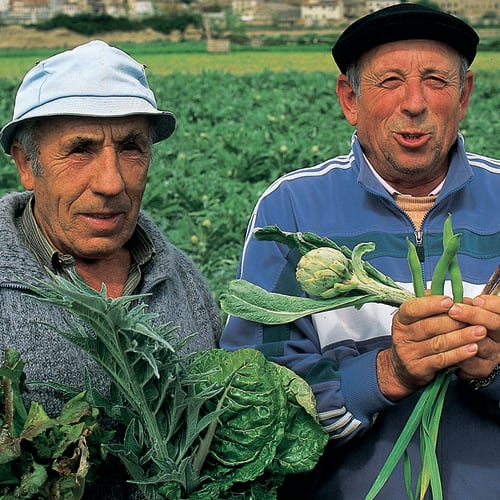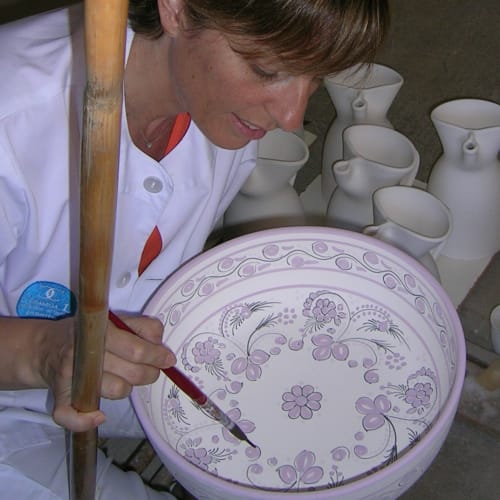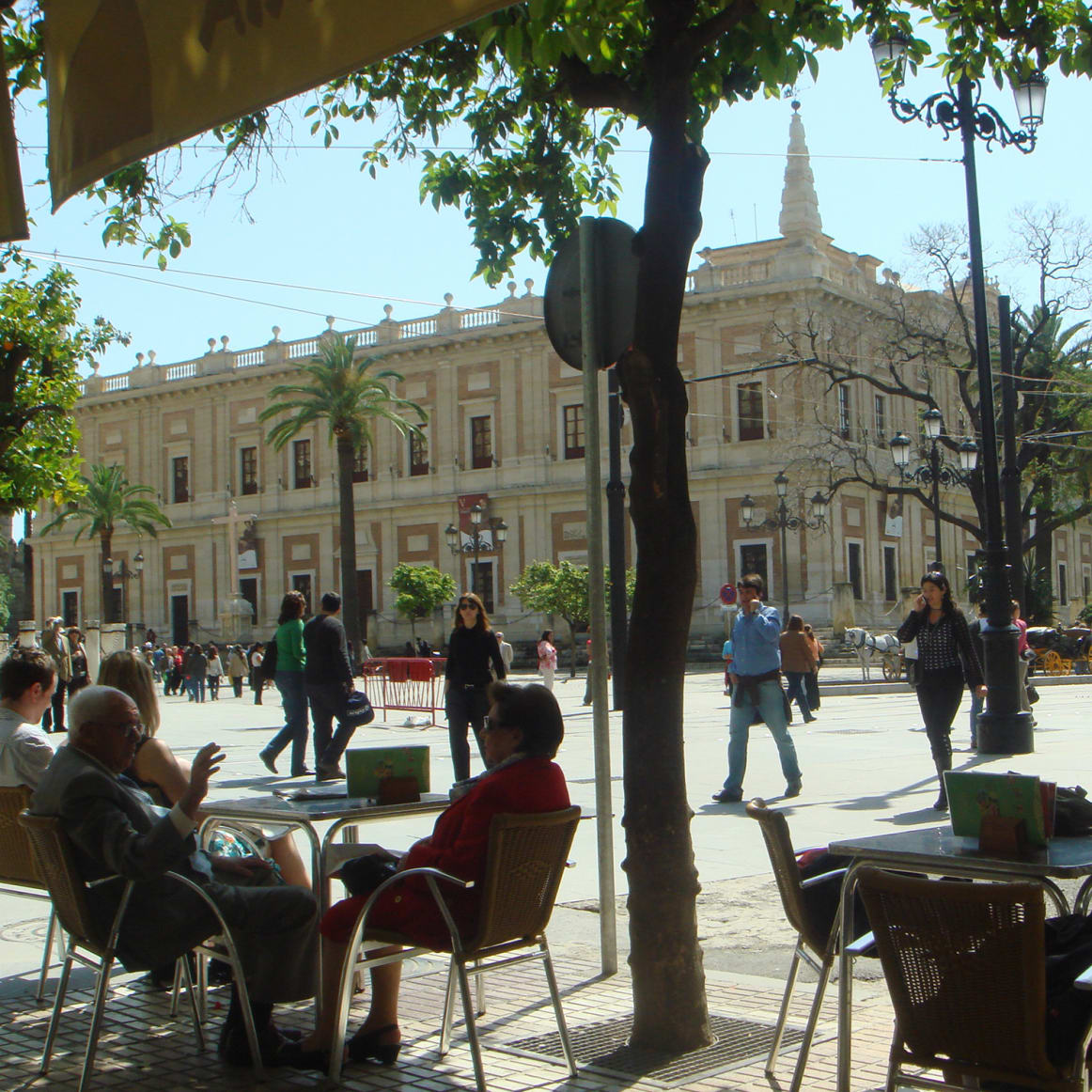Three Kings Sale - Up to 40% Off! Shop Sale
The Resilient, Welcoming People of Spain
January 2008




The other day I offered an older lady my favorite bon bon - a fig dipped in dark chocolate and brandy. She waved her finger, and said warmly, “No thank you, I don’t eat figs any more.” She explained, “when I was a little girl in Zaragoza, figs were the only food we had to eat. The Civil War was a terrible time, and World War II was worse.”
As we talked further among the group of shoppers getting their last minute polvorones, mantecados and jamón at our Christmas shop, (with the encouragement of other family members) she burst out singing a “jota” – a melancholy type of blues from traditional Aragon. Her strong clear voice sang of the River Ebro and the struggles of her people. Then with a twinkle in her eye and a warm embrace, she gathered her turrón, jamón and other treats and said, “I must go now. Felíz Navidad.”

That lady from Zaragoza, who has lived a life of both suffering and joy, captured for me that indefinable quality which is Spain: a personal engagement and joyful resilience that I have experienced in no other country. It may be due to the contributions of the people who have lived there since antiquity – Phoenicians, Carthaginians, Romans; Gauls and Goths; Syrians, Sephardim, and Berbers; pilgrims along the Camino de Santiago from all over Europe served by French Benedictine monasteries. Or it may be the 700 year Reconquista the people embarked upon together to free their country. It is an amazing amalgam.
Nevertheless, such speculation is but food for the intellect. What I know intuitively is that my heart was deeply touched the moment I first stepped ashore in Valencia in 1964, as a young newlywed Navy chaplain. It was as if I had found a spiritual home in a culture which in many ways embodied my ideals.
The following spring I brought over my wife Ruth to share in the magic. In due course we passed our appreciation of the Spanish people to our three boys - especially during the time lived in Andalucía and, with two boys in hand and one in a bassinet, we explored the byways of this fascinating land, and its warm and passionate people.
Sometimes when you are welcomed into a different culture, you appreciate it more than if you are born into it. With our three little boys we lived among a generous and warm people in the sherry town of El Puerto de Santa María. Our Spanish neighbors extended to us their hospitality, even though we were passing strangers, visitors. What impressed us most is how their extended families were the foundation of their lives. Their little children were precious, not only within the family but also were embraced by the neighborhood within which they would be nurtured.
I remember many years ago, when my eldest son Tim was a student at El Centro Inglés, a bilingual preschool, he and his little classmates were returned home in the middle of each school day. It was natural to include in the schedule a three hour siesta so that a young boy could relax at lunch with his family. Not the kind of hurried lunch in the school cafeteria that Tim’s sons experience in Virginia!
The routines of traditional Spain accommodate the natural rhythms of life. They affirm what is important for a spiritually healthy life: the centrality of the family and the need for a respite in the middle of the workday, and the need for a broader community. For, after the workday concludes in smaller towns, many people plan to drop by the same café as they have for years. They love to talk with their friends - many of whom they have known since they were children together!
This is a rhythm to life that leads to an intrinsic stability, punctuated by many fiestas, ferias and saints’ days. Every occasion, even shopping at the market, is treated as an event - an opportunity to be with friends and neighbors. The solitude and efficiency of online shopping is not appealing to the traditional Spaniard.
As the years unfold, new factors and accompanying attitudes emerge that compete with the underlying structure of the traditional society. As Spain arises from its slumber and trades with Europe and the world, urban values crowd out the traditional: a siesta becomes ‘inefficient’ because efficiency brings more prosperity. Sons and daughters leave home for universities and 'greener pastures.' The elements of cohesion become strained, and we can see the social consequences.

There is no point in yearning for the rural village, the oxen and plow. They are not the essence of tradition, they were born of necessity. But our family feels a commitment to support those who retain the core values. We know people for whom hand made production is the essence of their livelihood – such as those who weave esparto grass, or others who carve bowls of solid pieces of olive wood.
Others have adapted age-old procedures to bring quality products to more people. I think of the Gil family producing fine wine from the rocky soil of Jumilla, or Belen who has made her hand painted Puente ceramics dishwasher safe.
My family and I have been nourished by the special gift the people of Spain have brought to our lives over the years. We want to share this treasure we have found in these relationships, and what better way than to bring to your table the very food Spaniards share when they break bread together at a family meal, or the tapas they enjoy when friends gather at a neighborhood café.
However, by itself, sending you food does not reflect Spain. The heart of the Spanish culture is how they warmly engage you – as the Zaragoza lady did me. We try to reflect that personal involvement with everyone we meet, from you in the La Tienda community to our hardworking box packers. We also bring our North American values and strive to provide efficient, attentive service.
How do we effect a marriage of these two distinct cultures? We do it by having our heart in both. This then is how our typical second-generation American family (with roots in Holland, England, Ulster and Armenia) came to bring the best of Spain to you, and support traditional artisans in Spain. I guess it could only happen in America!
Felices Fiestas,
Don

